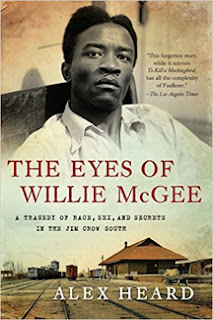Lynchsong
By Lorraine
Hansberry
I
can hear Rosalee
See the eyes of Willie McGee
My mother told me about
Lynchings
My mother told me about
The dark nights
And dirt roads
And torch lights
And lynch robes
See the eyes of Willie McGee
My mother told me about
Lynchings
My mother told me about
The dark nights
And dirt roads
And torch lights
And lynch robes
The
faces of men
Laughing white
Faces of men
Dead in the night
sorrow night
and a
sorrow night
faces of men
Laughing white
Faces of men
Dead in the night
sorrow night
and a
sorrow night
1951
* * * * *
When McGee was taken to the courthouse to be tried, he was transported in a National Guard truck and dressed in fatigues to disguise his identity and protect him.

The night before McGee was electrocuted in 1951 by the state of Mississippi, he wrote a farewell letter to his wife Rosalie:
Tell the people the real reason they are going to take my life is to keep the Negro down.... They can't do this if you and the children keep on fighting. Never forget to tell them why they killed their daddy. I know you won't fail me. Tell the people to keep on fighting.
Your truly husband, Will McGee.
Bop: Ancient as Willie McGee
I was fifty then, casually delirious like migrants,
jumping fences, retro-style. I’d spent time with Milton
Eisenhower, brother of a president, who interred souls
needing repair, for a semester; slept with Queen Mary
for years in a second story room in northeast DC—
swore off black women to escape heart burning romance.
It no good to stay in a white man country too long.
Here is why. The tongue between blond-haired thighs
fills heads with Willie McGee news, flashing blue lights,
frantic in hand-me-down pants from he who whispers
cutting Polish jokes in the Taliaferro halls of humanities.
I rubbed bellies with virgins, daughters of early Tidewater
settlers. I studied French with a Dutch family housed along
the wooded Platinum Coast among ever-green ancient oaks,
a haven for nouveau riche fearless of rebellious blacks.
It no good to stay in a white man country too long.
I graduated with my mind staid on reaching heaven
in the Ituri forests of the Kongo, northwest of Bukavu
near Lake Kivu—my eyes netted silhouettes of Zairean
fishermen in morning mist, a tattered hull on a rippling rift,
ghosts of King Leopold, father of illegitimate sons, chopped
limbs; mercenaries murdering Lumumba on his knees, ad nauseam.
It no good to stay in a white man country too long.
Rudolph Lewis 10 May
2016
In this gripping saga of race and retribution, Alex Heard (editorial director of Outside magazine) tells a moving and unforgettable story of the deep South that says as much about Mississippi today as it does about the mysteries of the past. In doing so, he evokes the bitter conflicts between black and white, north and south in America
by Alex Heard
In this gripping saga of race and retribution, Alex Heard (editorial director of Outside magazine) tells a moving and unforgettable story of the deep South that says as much about Mississippi today as it does about the mysteries of the past. In doing so, he evokes the bitter conflicts between black and white, north and south in America


No comments:
Post a Comment